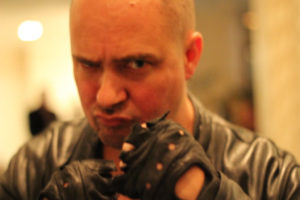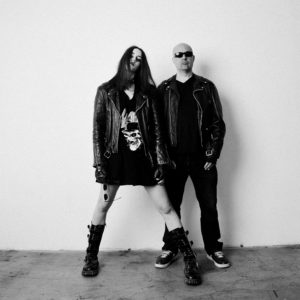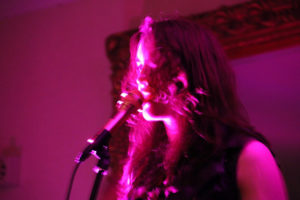What weird and winding path could possibly lead from the caustic roar of Slayer to the dreamy, confectionery bliss of synth pop? A road that not only exists, but that boasts a star-spangled parade of cultish icons like William Shatner, Glen Danzig and that gorgeously-narcissistic animated band of death metallers, Dethklok. The connector? Mark Brooks.
 A dyed-in-the-wool music industry lifer, Brooks has carried amps for Pantera, played in punk bands up and down the West Coast, befriended the guys in Nirvana, shot music videos for the likes of Slayer, Eminem and the Melvins and he even directed William Shatner in a feature film. In recent years, Brooks earned the enduring love of Planet Earth’s heavy metal legions when he began directing episodes of Adult Swim’s late night comedy juggernaut, Metalocalypse, Brendon Small’s animated saga of a five-piece international death metal band and the secret international tribunal out to stomp them.
A dyed-in-the-wool music industry lifer, Brooks has carried amps for Pantera, played in punk bands up and down the West Coast, befriended the guys in Nirvana, shot music videos for the likes of Slayer, Eminem and the Melvins and he even directed William Shatner in a feature film. In recent years, Brooks earned the enduring love of Planet Earth’s heavy metal legions when he began directing episodes of Adult Swim’s late night comedy juggernaut, Metalocalypse, Brendon Small’s animated saga of a five-piece international death metal band and the secret international tribunal out to stomp them.
Despite this surly, dues-fully-paid rock pedigree, you’d be wrong to write Brooks off as just another jaded, beer-swilling Motörhead freak. In recent years, he has rededicated his creative energies to exploring the sultry British synth pop of the early-80s through Night Club, his two piece band with his songwriting collaborator, vocalist and muse Emily Kavanaugh. Not only have they released a pair of EPs but last year they composed the original score for the animated Rob Lowe show Moonbeam City – a groovy 80s homage with brooding, yet immensely-danceable Miami Vice-style production. This year sees the duo release their long-awaited debut, Requiem for Romance – a gorgeous clutch of stupidly-infectious electro pop that feels like Ladytron holding Nine Inch Nails at gunpoint while making them run through Depeche Mode covers. We sat down with Brooks to talk about the state of music and why the best pop music is always dark and disturbing.
Let’s cut to the chase – is modern music dead, dying or thriving?
You know, I’ve been thinking about this a lot lately and I think that music is thriving. It’s like a weed breaking through the concrete – it’s strong, it’s going to live and do amazing things, but it gets no respect. You say, “It’s no match for that concrete.” But it can’t be stopped.
Does the music industry of today – a far cry from the juggernaut of the 70s – help or hurt its growth?
The music industry has given up, just as a whole lot of musicians have given up. But I’ve been playing in this band now for the past four years and from my view from the trenches, I’m seeing a lot of music being made. A lot of very cool music being made. The people who are motivated by profit are missing out because there’s a cultural thing happening right now that’s extremely cool. It reminds me of the emergence of punk rock in the late-70s. I’ve worked with guys like Danzig and the Slayer guys and it’s the same thing happening now. Glenn Danzig didn’t start the Misfits to make money, he started that band because he hated fucking Journey and all the shitty album-oriented rock that was dominating the airwaves. He wanted to make the music that he liked and I think that’s what’s happening right now. There’s all this amazingly cool stuff bubbling up in all genres of music right now and I’m honestly more excited about music now than I was when I was a kid.
 Thanks to user-friendly software like GarageBand and ProTools, anybody can record an album in their bedroom and consequently we’re seeing an avalanche of self-produced albums flooding the Internet. We can deride the old model of gatekeepers all we want, but has this dilution of quality subverted the music business just as much as something like Napster?
Thanks to user-friendly software like GarageBand and ProTools, anybody can record an album in their bedroom and consequently we’re seeing an avalanche of self-produced albums flooding the Internet. We can deride the old model of gatekeepers all we want, but has this dilution of quality subverted the music business just as much as something like Napster?
One hundred percent. Look, not everybody should be making a record. (laughs) But not everybody should be a five-star chef, either. That’s life. Some people are better at some things than others and that’s what life is all about — finding your strengths and your passions and making them work together. I love that if you really have a passion for music, even if you’re a completely talentless loser, you can still do it! You can put out your album and five people will listen to it and it will last forever. That level of freedom is amazing.
So what about pop? If you’re listening to the mainstream, that music has all been scrubbed a certain way and given a certain level of production and polish that you’ll never get on a DIY project. Does all that studio magic render the music disposable or is mainstream pop as vital now as it was in the 80s?
What’s different from today’s pop music than the mainstream pop of the 80s is that mainstream in the 80s would have maybe two writers who would produce a song and put it out. Now you’ve got maybe nine writers, a producer, an A&R guy and a lot of other cooks in the kitchen. So it’s not really the same thing because there are so many people working on it that it dilutes the originality, vision and personality of a single person. Night Club is very different in that regard — Emily and I write everything ourselves. We don’t run anything by anybody and we don’t test market any of that stuff. We make the music we like to make and to me, regardless of how it sounds to people, is way more punk rock than most indie rock bands.
How so?
Indie rock bands have to run the new stuff by their fans to get a sense of whether it’s cool enough or not, and then they have to see if their label’s cool with it and then if their PR guy can work with it. The reality is that when Emily and I sit down and make music, we ask, “Do you like it?” “Do I like it? Cool, then let’s put it out.” And I can’t think of anything more punk rock than that.
Now that Moonbeam City has ended, you’ve had time to regroup. What have you been up to this year?
You know, coming out of directing Metalocalypse and doing stuff like my projects with Slayer and Danzig, I renewed my interest in electronic music, which was so much of where my musical tastes originated; like Gary Numan and Ultravox and that early, early English new wave from the late-70s. So Emily and I got hooked back into this synthy electronic music and somehow we got tagged as a retro thing. That wasn’t necessarily what we were trying to do, but because that’s where our interests were, it led us into that classification. I don’t necessarily think that’s accurate, particularly because I don’t think Emily’s voice is very retro but as far as the music goes, I could see how people might view it that way.
So where do you fit in?
We always wanted to come across as Suicide-meets-Blondie-meets-Ultravox. But when the soundtrack for Moonbeam City fell on our laps, we got pulled into that 80s thing but ultimately I think we were independent of that scene because if you listen to even our early stuff, it very much has a punk, rock and even metal core. Even though we use synthesizers, those elements come across in the performance and in the attitude. For the new record, we realized we needed to break away from the pack and to make a darker, heavier record that reflected what we do live – a little more sordid, a little angrier, a little more heartbroken… Hopefully we hit that on the new record. In a lot of ways, it’s a very metal album, it just doesn’t have any guitars. (laughs) But its attitude is very metal – it’s basically a gigantic “Fuck you,” to everyone.
 How does such a bright and energetic pop record absorb such darkness?
How does such a bright and energetic pop record absorb such darkness?
The record devolved from our starting point, where we were happy, confident and things were working really well, but then things spiraled into us being mad at the world. I mean, just look at 2016 – it’s a complete clusterfuck. How can you not be influenced by this year? It’s a crazy fucking year. People might listen to Requiem and say, “Oh, this is straight pop music,” but when you dig in, it’s much more – it’s heartbreak, it’s anger, it’s back-stabbing and it’s a lot of things that actually happened to us in the past year. Everything on this record comes from a real feeling and a real experience either in our personal lives or the world. And ultimately, that’s the best kind of pop to me – you can sing along to it, it’s catchy and the themes are universal enough that everybody can relate.
Where can we hear that on the album?
To me, the pinnacle of the record is Dear Enemy. I don’t want to rag on who it is, but it’s about having friendships with people who care for you and then suddenly they’re not there for you. In fact, they’re actually against you. People might give it a cursory listen and write it off as just some pop song, but the stuff is actually really dark. Emily and I went through a really shitty year and the music reflects that, but we can’t not write pop songs! We love really catchy music and to me, that’s my favorite kind of pop music. Bright music with this really weird undercurrent. Nirvana was a great example of that. I mean, that guy was a mess, but those are great pop songs!
So where do you see this record landing? What sort of audience do you envision embracing this?
You know, I stopped even thinking that way because it just fucks with your mind as a creative person. I can’t predict what it’s going to be. I just can’t. Look at dance music- most dance music sucks balls. It’s awful. There’s Skrillex – he’s really good. Diplo – really good. The others? Not so good. You can break metal down like that and there’s no way to predict how it’s going to be embraced. I just know that I have a really strong sense of what we’re doing and I know that Emily does as well and we just look at it as literally a committee of two. “Do you like it?” “Yes.” “I like it, too. Let’s put it out.” If we don’t like it, it’s not coming out, and I can’t think of anything more DIY or more punk rock than that.
OK, let’s end with five yes or no subjects. I’ll give you the topic and you give us a yes or no.
Burning Man?
No. I don’t like hippies.
Streaming music?
Yes, because the more you get stuff out there, the more people can listen to it and I think that’s a good thing.
Facebook?
Ugh. Yes for bands, because you have to advertise and promote yourself. No as a person, because I don’t need to know that much about anyone. (laughs)
Point Break, the original film?
Never saw it! I can’t even say. And I’m not gonna see the new one either, man.
New Metallica?
Eh. No, I’m a Slayer guy.


